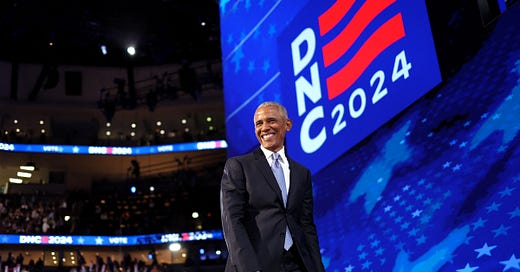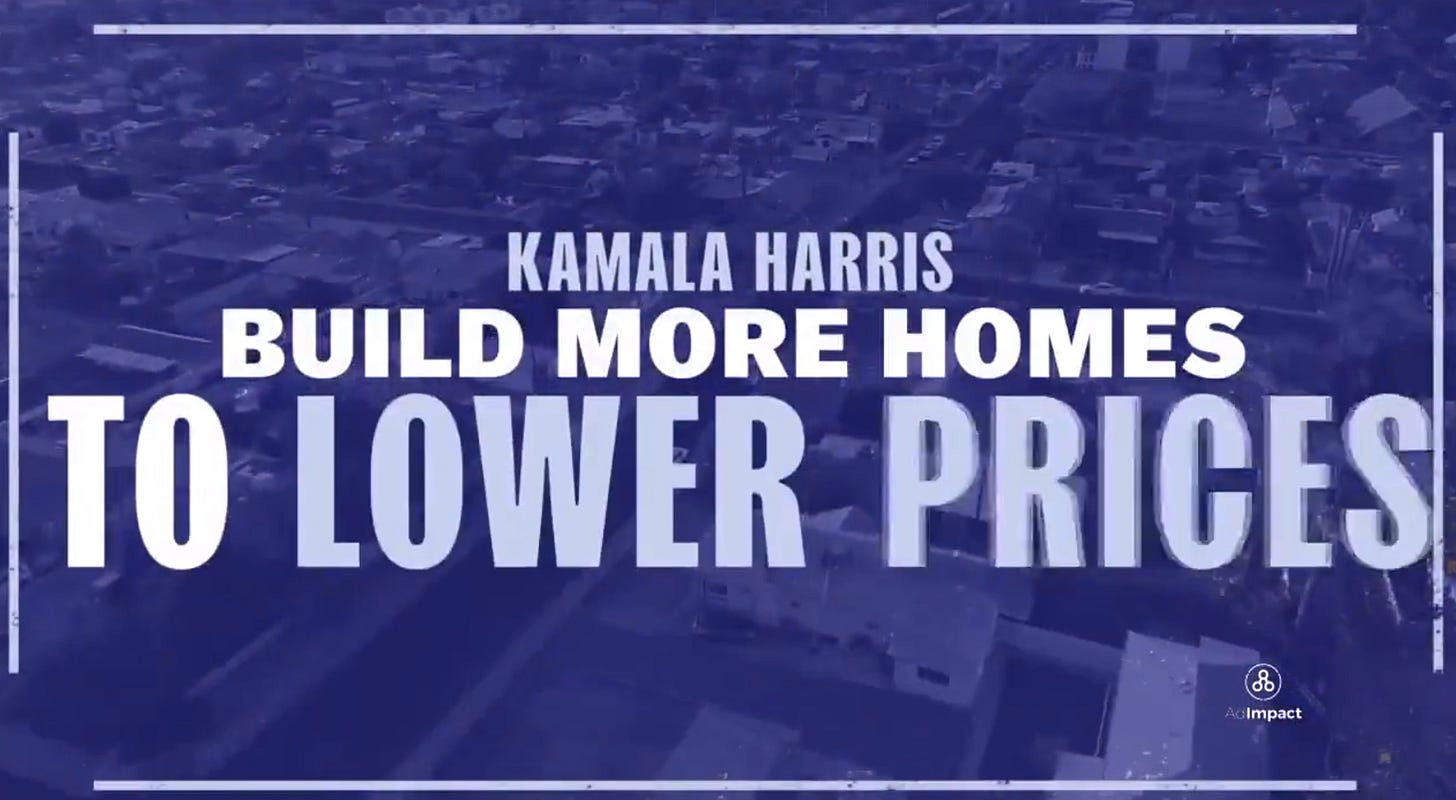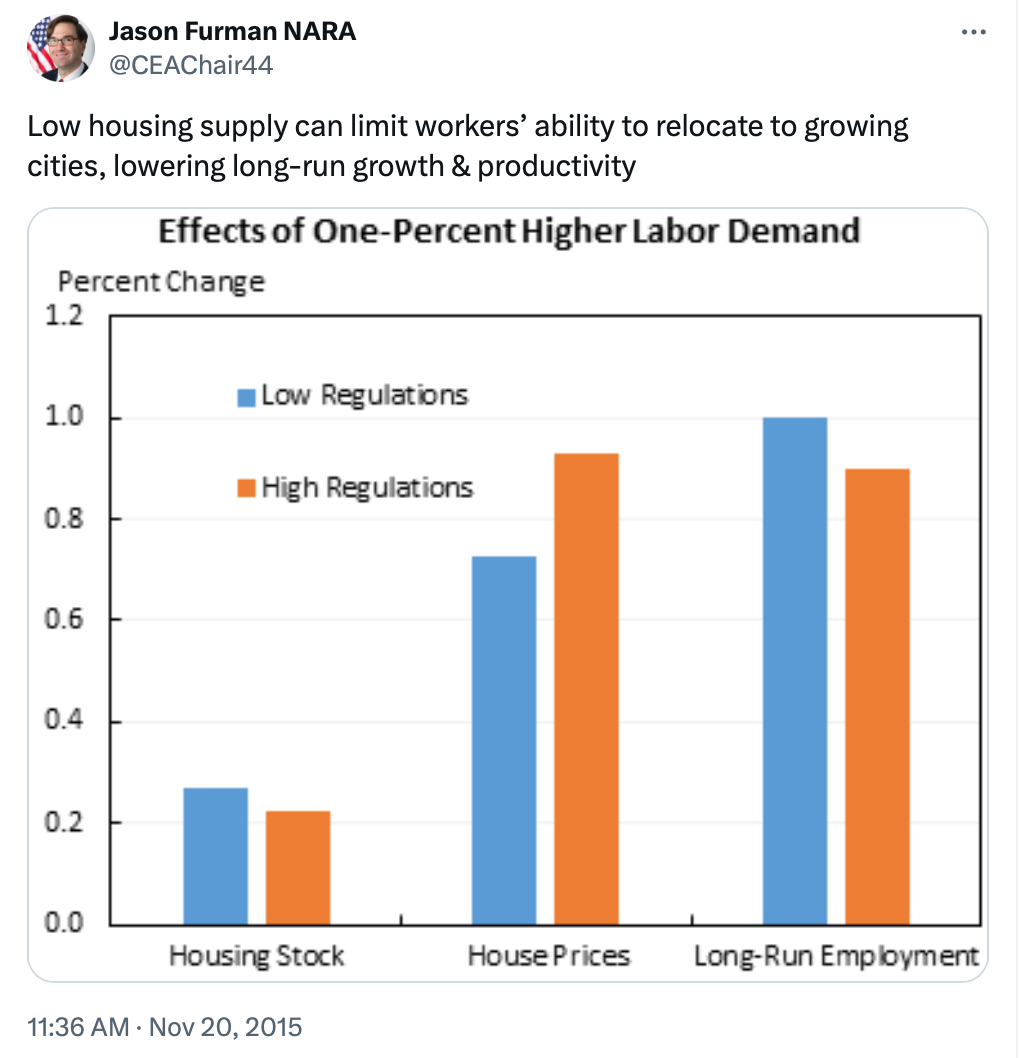Barack Obama set the housing world ablaze at the Democratic Convention last week with his call ”to build more units and clear away some of the outdated laws and regulations that made it harder to build homes for working people in this country.”
I am a sort of plodding and literal person, and the significance of this passed me by in real-time. After all, the Obama administration acknowledged the problem of barriers to housing supply in a Council of Economic Advisors report nearly a decade ago, and the Biden Administration has reaffirmed this judgment dozens of times. But to YIMBYs who are not dead inside, the speech was an important moment for two reasons. One is that it was an endorsement in the actual voice of Barack Obama from an extremely prominent stage, rather than the Obama CEA in a PDF. The other is that it was genuinely unexpected. There was no particular reason to think that Barack Obama would detour from the main themes of the convention to call for reform of land use regulations, and even in retrospect, it’s kind of mind-blowing that he did. And by saying it, in that way and in that forum, he cast Kamala Harris’s own housing supply commitments — like this still from one of her adds — in more a explicitly YIMBY light.
So what does it mean?
I think we’re seeing that Harris’s career — as a line prosecutor, as a district attorney, as Attorney-General of California, and then briefly as a senator, followed by her elevation to the vice presidency — just didn’t involve that much economic policy work. She is trying to define her own profile, and different camps are also trying to define it for her.
But beyond Obama or YIMBYism, as we move out of the most acute phase of inflation, it’s clear that concerns about housing costs are moving to the fore. When I wrote “The Rent is Too Damn High” in 2012, this was an eccentric policy interest, regardless of whether you agreed with my policy ideas. Today, housing is a mainstream topic of discussion, and people are arguing about what to do rather than whether it’s important.
And that rise in significance is a moment of promise but also of peril.
To the people actually doing the work in the trenches of advocacy and activism, higher salience is an almost unmitigated good; it’s easier to raise money for something people are talking about. But as long as nobody really cared about housing policy, there were strong incentives for elected officials to either do nothing on housing or else come up with good things to do. A lot of progress has been made, through mostly low-key and bipartisan approaches. If housing isn’t politically important, then earnest wonks can try to craft bipartisan bills, and members who don’t really care one way or another can often be induced to vote for them on the basis of “bipartisanship is good and experts like this.” If housing is at the white-hot center of the political universe, that raises the risk of bad ideas gaining traction and makes it perhaps more important to have political veterans like Obama weighing in on behalf of the light.
Please indulge my literalism first
That being said, I do want to discourage the interpretation of Obama (and to a lesser extent Harris) embracing YIMBYism at the convention as a new high-water mark for American housing policy.
Starting in his second term, the Obama administration consistently highlighted the idea that regulatory constraints to housing policy were a big problem, but they felt that there were very limited federal policy levers for addressing it. In 2016, though, they did release their “housing development toolkit,” which is essentially best practices for state and local housing reform, and they tried in various other ways to be helpful.
The Trump administration actually started off in a similar place: stated agreement with the basic YIMBY policy analysis with very little actual policy to back that up.
This changed in 2019. Cory Booker and James Clyburn released the HOME Act without much fanfare, but this law would have provided both demand-side subsidies to low-income renters and also required that states receiving Community Development Block Grants (CDBG) or Surface Transportation Block Grants (STBG) demonstrate “a strategy to support new policies, programs, or regulatory initiatives to create a more affordable elastic, and diverse housing supply.”
The CDBG part of this is kind of small-fry because that money goes to poor cities where land use reform is not a particularly high priority. But the STBG program is one of the main sources of federal highway funding, and linking it to land use reform could’ve been a big deal. It’s not entirely clear what you would need to do to qualify, but they list as illustrative examples that “a grantee could choose to reduce restrictions on lot size, eliminate parking requirements, or allow accessory dwelling units and multifamily homes.” I was a big fan of this proposal. Linking federal transportation funding to housing reform is something I proposed in my book, so I thought it was cool to see Booker and Clyburn take it up. Then in 2020, Joe Biden endorsed the proposal. I got very excited, though input from my right-YIMBY friends caused me to warn that we should make sure grantees are assessed on housing outcomes rather than prescriptive policy changes.
However, in an episode that should serve as a cautionary tale, the proximate result of this Biden/Booker/Clyburn YIMBY turn was that Trump started personally engaging with the subject through a demagogic campaign accusing Democrats of wanting to “abolish the suburbs.” The Heritage Foundation and Project 2025 are now endorsing NIMBYism on these grounds. Meanwhile, the actual apogee of federal YIMBYism came not during Obama’s high-profile speech, but in little-noticed wrangling over the terms of what became the Infrastructure Investment and Jobs Act. Some Democrats, including the White House, floated the idea of including something like the HOME Act in the bill, but this was deemed too contentious and got dropped. Since then, the Biden White House has put out lots of smaller pro-supply executive actions. At the same time, Up For Growth has worked with members of Congress on a variety of small-bore bipartisan housing supply bills.
State-level YIMBY action has been more promising. But land use reforms have run into the headwind of higher interest rates. And California has generally taken 2 steps forward, 1.9 steps back as localities find new ways to undermine housing production goals in the face of new pro-housing legislation.
So it’s great to get a shout-out from Obama, but it’s not obvious that this puts us any closer to solving anything.
What we need from Harris and from Congress
In congressional terms, I think we could use someone on the Democratic side to pick up where the HOME Act left off and shepherd this plan.
Compared to Democrats, Republicans are more likely to agree that deregulation is the solution to housing cost issues. But they are also more likely to object to federal meddling in local control of land use. So realistically, if you want an ambitious bill, you need to find an ambitious Republican and then do a lot of deferring to his judgment. That probably means you don’t pair the deregulatory measures with a big new spending program. And it probably means structuring the proposal to clarify that this bill is Uncle Sam owning the libs. As written, HOME requires all recipients to write a plan for improving land use, for example, even though the existing land use rules vary a lot from place to place. If you targeted requirements at the places that had the least favorable ratio of new permits to housing costs, then you’d be leaving the Midwest and vast swathes of the South off the hook. But I’m not a Republican member of Congress. You’d need to genuinely try to talk it through with them.
Harris herself, meanwhile, should consider pro-supply housing policies that are a little remote from zoning. I was really proud that Slow Boring helped the Federation of American Scientists solicit federal housing supply ideas, and the most promising candidates are all published now, with good vetting and the tires kicked on the details.
One of the proposals is a dramatic plan to link transportation funding to land use reforms, but there’s also a good idea about western water grants, a bunch of small-bore nerdy stuff, and two ideas to make the tax credits the federal government uses to subsidize low-income housing construction more effective. This last one is particularly important because Harris has committed to supply-side spending and ought to try to maximize the efficacy of that. An incredibly in-the-weeds way for her to move to the center on housing would be to adopt Niskanen’s recommended modifications to the Affirmative Forwarding Fair Housing rule. AFFH was originally created by Obama, rolled back by Trump, and reinstated by Biden. The policy is basically supposed to increase housing supply but is written as such an everything bagel checklist to have very little efficacy while also annoying people. A better AFFH would code as more moderate and also probably accomplish more.
There is also the touchy subject of the Federal Housing Administration’s oversight of Fannie Mae and Freddie Mac. In the wake of the 2008 financial crisis, lending rules have gotten dramatically stricter, and the potential buyers of a classic “starter home” can’t really get a mortgage anymore. A lot of analysis gets this backwards and suggests nobody buys small cheap single family homes because they don’t build them anymore. It’s closer to the mark to say these don’t get built because the potential buyers for such homes couldn’t get loans to buy them. One potential solution would be to have large institutional investors provide the capital to build cheap single family homes and then rent them out. But much as it would warm my neoliberal heart to see Democrats fulsomely embrace “corporate landlords,” that seems politically unlikely. A better approach might be to ease up on the mortgage regulations. I know, I know, the financial crisis. But Kevin Erdmann makes the case that we ended up overcorrecting. Now it’s not just subprime borrowers who now can’t get loans. Both average FICO scores and the average price of prime loans have jumped since the crisis.
And finally, fiscal discipline matters. Donald Trump’s plan to blow up the deficit with tax cuts for the rich comes at a price to the middle class: higher mortgage interest rates and less home building. This is not the classic YIMBY formula, but it is relevant to housing supply. Meanwhile, I wouldn’t totally discount the value of pure thought leadership.
Strategic cheap talk can help
If I go back to Obama’s words at the convention, I think he was trying to accomplish something more than just adding new bullet points to a white paper. Let’s look at the whole paragraph:
We have a different task. Our job is to convince people that democracy can actually deliver. And, and in doing that, we can’t just point to what we’ve already accomplished. We can’t just rely on the ideas of the past. We need to chart a new way forward to meet the challenges of today. And Kamala understands this. She knows, for example, that if we want to make it easier for more young people to buy a home, we need to build more units and clear away some of the outdated laws and regulations that made it harder to build homes for working people in this country. That is a priority. And she’s put out a bold new plan to do just that.
Obama is saying here that he (like, according to him, Kamala Harris) is not a dogmatic leftist who thinks the answer to every problem is more taxes, more spending, and more regulation. He acknowledges that in some cases, we need less regulation. Not because he’s a dogmatic libertarian, but because the laws restricting housing supply are “outdated” and “we need to chart a new way forward to meet the challenges of today.”
Leftists like to say that Obama’s political appeal is just his charisma, but I think a big part of that charisma is that he portrays himself as a thoughtful person who is capable of independent cognitive function and policy analysis. And he wants Harris to portray herself the same way. After all, if we’re talking about the cost of living, it’s probably going to occur to at least some voters in Nevada and Arizona and Georgia that the cost of living is a lot higher in California and New York, and maybe they’ll think Democrats are just bad at addressing cost of living issues. Showing awareness that there are, perhaps, some flawed policies in place that need to be corrected shows that you’re a sensible person who can be trusted with political power.
But I think the message is arguably strengthened by a little more specificity.
Right now, in New York City, there’s a big fight over the “City of Yes” proposal to make it easier to build. In San Francisco, huge sums of money have been pumped into a city council race pitting incumbent supervisor Dean Preston against YIMBY challenger Bilal Mahmood. These are both progressive politicians (it’s a local race in San Francisco), but Preston is championing the left-NIMBY formula that only 100 percent below market-rate housing is acceptable (i.e., in practice almost nothing will get built), while Mahmood is trying to muster a commonsense solution for abundant housing. Preston has secured national support from Bernie Sanders and local/national support from Nancy Pelosi (who is seeking allies to help put her daughter in her House seat when she retires). Mahmoud is supported by the mayor, California’s attorney general, and other local stakeholders. If Sanders can wade into a San Francisco supervisor race, why not Obama? If Pelosi can throw weight around in her home city, why not Harris? Or if intervening in a primary is too hot, either of them could easily endorse the City of Yes.
This kind of localized position-taking has two values. One is that urban politics just lacks partisan organization since everyone involved is a Democrat, and most voters have little idea what’s going on or who they “should” support on any given controversy. High-profile figures like Obama and Harris saying the “build baby build” faction is good would sway the minds of lots of people with only weakly held views.
But the other value is that framing the housing abundance pitch — which the Biden administration is already committed to on a policy level — as “we are trying to fix some governance issues in the Blue Zone by advocating for deregulation” strikes me as much better than “city-pilled liberals hate the suburbs.” Of course, to an extent, both things can be true: The YIMBY movement gains support both from a free market economic analysis and also an effective appreciation of density. But the former situates its advocates in a broadly appealing national political context, which is what Harris needs to do to win the election.








The (solvable) contradiction in the Party today is that reducing regulations around housing and allowing new construction will result in disfavored people -- developers, building owners, HVAC installers, various construction companies -- making money.
We are now the Party of the upper middle class and it is time we embraced it. We can help the poor, we can be in favor of a strong safety net. But we need to drop the anti-profit and anti-rich attitude.
The last part gets to why I think most YIMBYs were more excited than Matt. Obama is not going to endorse in Bloomington Indiana city council races. But I have a new city councilor who got into politics via gun control advocacy and doesn't seem to have firm views on housing, although she's said some unfortunate NIMBY stuff. I'm confident, though, that she thinks Barack Obama is great. So him endorsing good policy will help move a lot of people in the right direction in high cost places across the country.